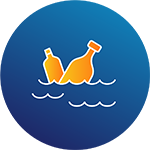
Ocean Sustainability
Balancing Prosperity and Protection
Approaching the topic of “ocean sustainability” can be a rather sensitive endeavor. One reason for this is that there doesn’t seem to be a single accepted definition of the term “sustainability.” So, depending on your scientific, political, or environmental leaning, the meaning of sustainability in general, and ocean sustainability, in particular, can vary depending on who is using the term and in what context it is being used. Another reason is that the very idea of using the ocean’s resources for our benefit – no matter how well managed – is neither universally accepted nor supported. But with over three billion people’s livelihoods directly dependent on coastal and marine ecosystems[1], it would be unrealistic to think we could ever completely step away from our dependence on the ocean.
While there is no universal definition of sustainability, an often quoted definition comes from the UN World Commission on Environment and Development: “sustainable development is development that meets the needs of the present without compromising the ability of future generations to meet their own needs.”[2] Ocean sustainability, then, is all about approaching ocean management in a way that protects the ocean and the services it provides.[3] It is, in short, a balancing act between what is good for the health and well-being of the ocean and what is good for the economic well-being of those who are dependent on the ocean. Ocean sustainability requires the “use of ocean resources in ways that preserve the health and resilience of marine ecosystems and improves livelihoods and jobs, balancing protection and prosperity.”[4]
Life Under Water
In 2015, the United Nations adopted the Sustainable Development Goals. The adoption of the 17 Sustainable Development Goals was a universal call to action to end poverty, protect the planet, and ensure that by 2030 all people enjoy peace and prosperity. Sustainable Development Goal 14 is “Conserve and sustainably use the oceans, seas and marine resources” or, more colloquially, “Life Under Water.” Goal 14 sets forth ten specific targets to be reached:
14.1 Reduce Marine Pollution. By 2025, prevent and significantly reduce marine pollution of all kinds, in particular from land-based activities, including marine debris and nutrient pollution
14.2 Protect and Restore Ecosystems. By 2020, sustainably manage and protect marine and coastal ecosystems to avoid significant adverse impacts, including by strengthening their resilience, and take action for their restoration in order to achieve healthy and productive oceans
14.3 Reduce ocean acidification. Minimize and address the impacts of ocean acidification, including through enhanced scientific cooperation at all levels
14.4 Fish stocks within sustainable levels. By 2020, effectively regulate harvesting and end overfishing, illegal, unreported and unregulated fishing and destructive fishing practices and implement science-based management plans, in order to restore fish stocks in the shortest time feasible, at least to levels that can produce maximum sustainable yield as determined by their biological characteristics
14.5 Protected Marine Areas. By 2020, conserve at least 10 per cent of coastal and marine areas, consistent with national and international law and based on the best available scientific information
14.6 Combat Illegal, Unreported and Unregulated Fishing. By 2020, prohibit certain forms of fisheries subsidies which contribute to overcapacity and overfishing, eliminate subsidies that contribute to illegal, unreported and unregulated fishing and refrain from introducing new such subsidies, recognizing that appropriate and effective special and differential treatment for developing and least developed countries should be an integral part of the World Trade Organization fisheries subsidies negotiation
14.7 Income from Sustainable Fisheries. By 2030, increase the economic benefits to Small Island developing States and least developed countries from the sustainable use of marine resources, including through sustainable management of fisheries, aquaculture and tourism
14.A Research Resources for Marine Technology. Increase scientific knowledge, develop research capacity and transfer marine technology, taking into account the Intergovernmental Oceanographic Commission Criteria and Guidelines on the Transfer of Marine Technology, in order to improve ocean health and to enhance the contribution of marine biodiversity to the development of developing countries, in particular small island developing States and least developed countries
14.B Support Small Scale Fishers. Provide access for small-scale artisanal fishers to marine resources and markets
14.C Implementing International Sea Law. Enhance the conservation and sustainable use of oceans and their resources by implementing international law as reflected in UNCLOS, which provides the legal framework for the conservation and sustainable use of oceans and their resources, as recalled in paragraph 158 of The Future We Want [5]
Why It Matters
Health and Well-Being
A healthy ocean is essential to our existence. Whether we live near the coast or far from the ocean’s shores, the ocean impacts the health and well-being of every one of us. Consider these facts:
- The ocean generates over half the oxygen we breathe.[6]
- The ocean is the largest biosphere on Earth.[7]
- The ocean contains 97% of Earth’s water.[8]
- The ocean is home to 50 – 80% of all life on Earth.[9]
- The ocean plays a crucial role in regulating our climate and weather.[10]
- The ocean provides nearly 3 billion people with their primary source of protein.[11]
Economic Impact
The ocean also has an enormous impact on both the U.S. domestic and global economies. While the value of the ocean and its resources is incalculable, snapshots of different areas of the ocean economy show that:
- Over 3 billion people’s livelihoods depend directly on coastal and marine ecosystems.[12]
- The market value of ocean resources and industries is estimated at $3 trillion per year or about 5 percent of global GDP.[13]
- Marine fisheries directly or indirectly employ over 200 million people.[14]
- About 80% of all tourism takes place in coastal areas.[15]
- 90% of international freight involves marine transporta[16]
An Ocean at Risk
But with less than 3% of the ocean protected, the ocean is at grave risk. Specifically:
- By 2050 there will be more plastic than fish in the ocean.[17]
- The ocean has absorbed over 90% of the excess heat trapped by man-made greenhouse gases.[18]
- Ocean heat is now at record levels, causing widespread marine heatwaves.[19]
- The sea level has risen over 8 inches since 1880 (with about 3 of those inches gained in the last 25 years).[20]
- Every year, an estimated 5 to 12 million metric tons of plastic enter the ocean.[21]
- The ocean has become more acidic due to the absorption of increased levels of atmospheric carbon dioxide. [22]
- Global fish stocks are being depleted, and marine life is decimated by overfishing. [23]
Ocean Sustainability and Marine Conservation
While these two very important concepts certainly overlap, they should not be considered the same thing. And depending on where you fall on the conservation-sustainability spectrum, the amount of overlap is going to vary greatly. As mentioned above, there are certain marine conservationists that are completely against using the resources of the ocean, sustainable or not. And there are others that see ocean sustainability as an integral part of the marine conservation landscape. One way of looking at how these two areas fit together is to consider marine conservation as one-half of the ocean sustainability equation. Conservation traditionally involves “the preservation, protection, or restoration of the natural environment or natural ecosystem.”[24] Those that advocate for ocean sustainability would wholeheartedly agree with this goal, but not at the expense of the economic well-being of the billions of people who are dependent on the resources the ocean has to offer.
Life Under Water (Revisited)
Returning to Life Under Water (Sustainable Development Goal 14), the preamble to the list of goals sums up the ocean sustainability issue quite nicely:
“The ocean drives global systems that make the Earth habitable for humankind. Our rainwater, drinking water, weather, climate, coastlines, much of our food, and even the oxygen in the air we breathe, are all ultimately provided and regulated by the sea. Careful management of this essential global resource is a key feature of a sustainable future. However, at the current time, there is a continuous deterioration of coastal waters owing to pollution, and ocean acidification is having an adversarial effect on the functioning of ecosystems and biodiversity. This is also negatively impacting small scale fisheries. Saving our ocean must remain a priority. Marine biodiversity is critical to the health of people and our planet. Marine protected areas need to be effectively managed and well-resourced and regulations need to be put in place to reduce overfishing, marine pollution and ocean acidification.”[25]
…
Citations
- Life Below Water, United Nations Sustainable Development Goals.
- Report of the World Commission on Environment and Development: Our Common Future.
- World Ocean Day: What is ocean sustainability?
- Integrated Ocean Management Blue Paper 14, Winther, J. G. et al., World Resources Institute, (2020).
- Life Below Water, United Nations Sustainable Development Goals.
- Why should we care about the ocean?, National Ocean Service, NOAA.
- About the Ocean, World Resources Institute.
- Life Below Water, United Nations Sustainable Development Goals.
- About the Ocean, World Resources Institute.
- Why should we care about the ocean?, National Ocean Service, NOAA.
- Sustainable Seafood, World Wildlife Fund.
- Life Below Water, United Nations Sustainable Development Goals.
- Life Below Water, United Nations Sustainable Development Goals.
- Life Below Water, United Nations Sustainable Development Goals.
- Why should we care about the ocean?, National Ocean Service, NOAA.
- The Ocean Economy in 2030, Organisation for Economic Co-operation and Development.
- Will the ocean really be dead in 50 years?, The Natural History Museum, London
- Why the Ocean is Everybody’s Business, Ocean Unite.
- Climate Change Indicators: Oceans, U.S. Environmental Protection Agency.
- Sea Level Rise Explained, National Geographic
- Life Below Water, United Nations Sustainable Development Goals.
- Climate Change Indicators: Oceans, U.S. Environmental Protection Agency.
- The sea is running out of fish, despite nations’ pledges to stop it, Woody, Todd, National Geographic (2019).
- Marine “Conservation”: You Keep Using That Word but I Don’t Think It Means What You Think It Means, Frontiers in Marine Science, Marine Conservation and Sustainability (2017).
- Life Below Water, United Nations Sustainable Development Goals.

The Path to Becoming an Ocean Sustainability Advocate
From High School to Your First Job
Build a Solid Academic Foundation
Basics:
Take all available STEM-related (biology, physics, chemistry, computer science, mathematics), political science, government, and public speaking courses offered at your high school. Take all these classes at the most advanced level possible. Join your high school’s debate team and/or model UN team.
Recommended:
If not available at your high school, try and take ocean-related (oceanography, marine biology) classes offered online. Try and get an internship with an ocean sustainability advocacy group or volunteer your time to help an ocean-related organization. Learn as much as you can about the advocacy process.
Keep in Mind:
Advocacy is not something that is typically taught in high school so it is more something that you will need to learn by doing. There are dozens and dozens of ocean advocacy organizations ranging from grassroots to international that you can become involved with as an intern, paid employee, or volunteer.
Dive In!
And become an expert
![]()
Peruse our library of must-read books
![]()
Thumb through a relevant publication
![]()
Take an online course
![]()
Watch an interesting video
![]()
Check out these great websites
Get a

jump on your Academic career
There’s no substitute for experience.
We have compiled a database of thousands of internships, research opportunities, academic programs and specialized training programs so you can get a jump on your academic career.
Internships
Research
Academic Training Programs
And if you need support to fulfill your dreams and ambitions, our searchable database has plenty of scholarship opportunities as well as programs designed to increase diversity.
Scholarships
Diversity, Equity & Inclusion
Need Help Finding Your Opportunity?
Our video tutorials explain the ins and outs of landing a great internship, research project or training program.
Make all the right moves
Advice from those who know
Maintain an excellent GPA as an undergraduate so you can attend graduate or law school
Gain experience through internships and volunteering
Have some background in marine, environmental, or conservation science
Have some work experience on your resume
Attend sustainability and conservation conferences and seminars
Develop excellent public speaking and written communication skills
Join professional societies and organizations
Stay current by reading industry and professional journals
Learn about current research projects
What degree is right for you?

Undergraduate Degree
While a college degree is not required for engaging in ocean sustainability activities, obtaining your bachelor’s degree will give you a greater chance of securing paid employment. You can go the science route or the law/policy route or perhaps even pursue both. But even if you opt for a non-scientific career path, familiarity with the science of marine conservation, sustainable development, marine biology, oceanography, or any climate change science is advisable.
Graduate Degree
If you are pursuing the scientific aspects of ocean sustainability, a master’s degree will open up more employment opportunities. A doctoral degree is required for a career in academia as well as for senior positions in both the government and private sectors. Graduating from law school or obtaining a graduate degree in sustainability or conservation studies is essential for advancement in the non-scientific areas of ocean sustainability.
10 Schools With Excellent Ocean Sustainability Programs
Want to see the full list of colleges and universities with degree offerings or relevant courses?
Sustainable Environmental Design
University of California-Berkeley
Climate Justice and Sustainability
College of the Environment, University of Washington
Sustainable Development
Columbia University
Sustainability
Oregon State University
Sustainability Studies
University of Florida
Sustainable Design
University of Illinois
Sustainability Studies
Colorado Mountain College
Sustainability
Miami University
Environment and Sustainability
Sewanee – The University of the South
Environmental and Sustainability Studies
George Mason University
![]()
Tip 1
We could not find one school with a specific ocean sustainability major. Find a school with a sustainable development or sustainable studies program and combine it with a marine science to develop your own area of expertise.
![]()
Tip 2
Even if you decide to go the business, environmental law, or public policy route in school instead of the pure science route, you should still develop a strong background in sustainability, conservation, or one of the areas of marine science.
![]()
Tip 3
You need to learn how to network. Internships and volunteering are both excellent ways to create connections with potential employers, evidence your unique set of skills, and show off your commitment to sustainability.
Have familiarity with one or more of the following areas

Marine pollution

Marine technology

Fisheries

Marine protected areas

Ecotourism

Marine conservation

Climate change

Coastal management

Blue economy

International Law of the Sea
Typical Job Functions of an Ocean Sustainability Advocate
Here are some of the interesting things you could be doing.
Coordinating marine educational and outreach programs.
Helping draft sustainable development legislation.
Establishing marine protected areas.
Navigating international treaties governing the use of marine resources.
Establishing programs for ecotourism.
Providing guidance for fisheries management.
Managing an aquaculture farm.
Exploring ways to improve renewable energy systems.
Using resources from aquatic organisms to develop commercially viable products.
Engaging in eco-friendly maritime transport.
There’s an Ocean of Possibilities
A career in ocean sustainability can be tremendously rewarding. It also can provide you with an extremely wide variety of career choices depending on which area of sustainability you pursue. There are positions in government agencies, nonprofit organizations, private industry, and academia. Although some of these careers do not necessarily require an environmental or marine science background, at the very least, you will most likely need an understanding of the current scientific landscape.
Common career paths include:
Policy Path
- Lobbyist
- Environmental Lawyer
- Litigation Attorney
- Sustainability Policy Advisor
- Legislator
- Urban Planner
STEM Path
- Environmental Scientist
- Climatologist
- Chemist
- Biologist
- Biotechnologist
- Geoscientist
- Hydrologist
- Ecologist
- Agricultural Scientist
- Meteorologist
- Aquaculturalist
- Sustainability Engineer
- Environmental Engineer
- Coastal Engineer
- Clean Energy Engineer
- Environmental Technician
- Natural Resource Specialist
- Life Scientist
- Physical Scientist
- Toxicologist
Nonprofit Organization Path
- Executive Director
- Communications Director
- Attorney
- Financial Officer
- Community Organizer
- Grants Manager
- Program Manager
- Campaign Manager
- Field Organizer
- Fundraising Officer
- Digital Fundraiser
- Fundraising Assistant
- Conflict Mediator
- Legislative and Regulatory Specialist
- Events Manager
- Intern
Blue Economy Path
- Aquaculture
- Fisheries
- Tourism
- Ecotourism
- Marine Transport
- Renewable Energy
- Biotechnology
- Ship Building
- Environmental Consulting
Government Agency Path
- Accountant and Budget Specialist
- Administrative Support Specialist
- Attorney
- Biologist
- Chemist
- Communications and Public Affairs Specialist
- Computer/Information Technology Specialist
- Contracts Specialist
- Ecologist
- Economist
- Epidemiologist
- Engineer
- Financial Specialist
- Human Resources Specialist
- Information Technology Specialist
- Intelligence Research Specialist
- Law Enforcement Agent
- Lab Technician
- Life Scientist
- Management Analyst
- Physical Scientist
- Social Scientist
- Toxicologist
Academia
- Universities
- Research Institutions
Start your career search with our extensive list of employment websites.
